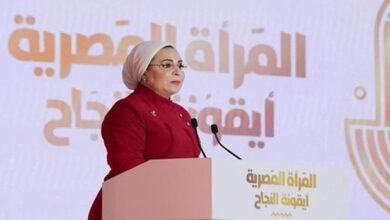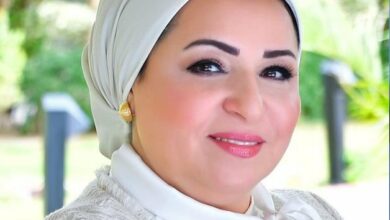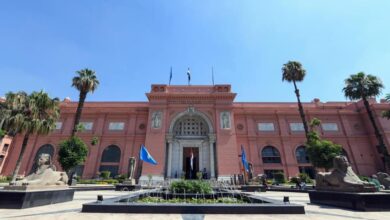In celebration of the 100th International Women’s Day, a group of women’s rights activists organized a One Million Women March this afternoon at the heart of the Egyptian capital, Tahrir Square. The turnout did not exceed a few hundred people, which Aalam Wassef, one of the organizers of the march, concedes matched their expectations.
As they convened in front of the Egyptian Museum, al-Mogama’ building and Abdel Moneim Reyad Square, men and women demanded a civil and constitutional state that is free from all forms of discrimination and the active participation of women in the ongoing reforms and shaping of the constitutional, legal and political future of the country. Other demands included canceling all discriminatory laws and combating violence against women.
Many people, nevertheless, described the demands as those of “interest groups” and compared them to calls made by workers in certain labor sectors over the past few weeks. The main point of contention was the last demand written on the flyer, which they distributed to by-passers. It requested women have the right to run in presidential elections.
The recent constitutional amendments scheduled for referendum on 19 March do, in fact, grant women this right. Constitutional committee members recently explained the condition that the presidential candidate be Masry (Egyptian) refers to both male and female Egyptian citizens, although in Arabic language, the term is generally used to refer to male Egyptians. The wording of the statute has been highly debated by women’s right groups saying that it allows for misinterpretation and hence abuse.
Protesters were condemned by the public at Tahrir Square on Tuesday largely due to that demand. The criticism and aggression experienced by protesters during the demonstration, which ranged from insults to assaults, suggests the democratic movement is hypocritical, explained Wassef. Unless women’s rights are clearly embedded in the new constitution, he added, discrimination against women will continue for another hundred years.
Nehal Ismail, a research analyst at the Egyptian National Competitiveness Council, who was distributing flyers at the march, supports all the demands issued by the demonstrators except that of a female presidential candidacy. Her reservations stem from her religious believes, she told Al-Masry Al-Youm.
Several people, who began discussing the demands with the protesters, stressed the same point, citing verses from the Quran. Engineer Sayed Zahran, however, stated that no religion, including Islam, discriminates against people. Those Quranic verses, he said, are taken out of context and misinterpreted.
“Women should have the right to run for political positions like everyone else," explained Zahran. "It's the people who should be able to choose amongst the candidates based on merit."
The presidential candidacy goal may be far fetched at this point, according to graduate student of history at New York University Yousra Sultan.
“I believe in all these demands and that we need to start raising awareness about them now for them to be possible over the course of the coming century,” she told Al-Masry Al-Youm as she walked from Abdel Moneim Reyad Square towards Tahrir.
The demands, Sultan believes, should, however, have been phrased differently. Instead of requesting female presidential candidates, equal participation rights in political life should have been urged. That aim essentially adds up to the same thing, Sultan said, while being less provocative to the public.
Wassef, however, disagrees, claiming the objective of political equality would create “an illusion of acceptance” that is baseless. Now, at least, Wassef added, women are aware of being surrounded by the same hostile environment and understand they need to continue fighting for equal rights.
Sultan added that the demands were phrased in accordance with Western and classist feminist discourses, while being less sensitive to the demands of the vast majority of Egyptian women. Female breadwinners represent an increasing portion of the Egyptian population. In many cases they are the main or sole supporter of their households. The divorced and the widowed have little support from the government and their demands are related to social justice rather than political rights, as Haja Amal, a divorced woman in her sixties, told Al-Masry Al-Youm.
“My main demand is supporting the poor female-headed households,” Amal, who supports a mentally challenged son and a daughter who suffers from a chronic lung disease, said. The LE140 pension she receives from the Ministry of Social Solidarity is less than the rent of the flat she lives in one of Cairo’s shantytowns.
The demands need to be rephrased to reflect the aspirations of the vast majority of Egyptian women, Sultan argued. The manner in which the demands are addressed in the flyers, according to Sultan, seem to be phrased in ways that are less accessible to many people, raising criticism and even the possibility of assault on protesters.
Wassef explained the hostile reaction of the public was expected as the protesters were addressing a “socio-cultural taboo.” The protests for women’s right must, nevertheless, continue because, Wassef said, it displays societal hypocrisy.
In time, more awareness and consciousness about the rights of women will spread, Wassef, who is planning another march on Wednesday 16 March–the Egyptian Women’s Day, says.




